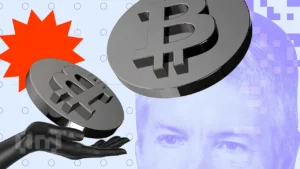Bitcoin Proposal Redefines Units, Making Satoshi the New BTC

The Bitcoin community is reviewing a proposal to eliminate decimals and redefine the top asset’s unit of measurement.
This initiative seeks to enhance user experience and simplify understanding, but it has sparked debate among enthusiasts.
Debate Heats Over ‘1 Bitcoin = 1 Satoshi’ Proposal
Bitcoin advocate John Carvalho introduced a Bitcoin Improvement Proposal (BIP) to change how cryptocurrency is measured. His idea replaces the smallest indivisible unit, the Satoshi, with the term Bitcoin.
“This BIP proposes redefining the commonly recognized ‘bitcoin’ unit so that what was previously known as the smallest indivisible unit becomes the primary reference unit. Under this proposal, one bitcoin is defined as that smallest unit, eliminating the need for decimal places,” Carvalho wrote.
Under this plan, one Bitcoin would represent what is currently known as one Satoshi. This redefinition would turn 0.00010000 BTC into 10,000 Bitcoins.
Carvalho explained that this change aligns Bitcoin’s unit of measurement with its underlying protocol, making the system easier to grasp. Moreover, he noted that reducing the reliance on decimals would lower the cognitive effort needed to understand Bitcoin. This clarity, he argued, would improve both education and user experience.
Historically, users define one Bitcoin as 100 million base units. Carvalho’s proposal redefines this concept by making the smallest unit the primary reference. Under the proposed system, 1 BTC becomes 100 million Bitcoins. He emphasizes that this shift simplifies Bitcoin communication while maintaining the protocol’s core principles.
“The current convention defines one BTC as 100,000,000 of the smallest indivisible units. This representation requires dealing with eight decimal places, which can be confusing and foster the misconception that bitcoin is inherently decimal-based. In reality, Bitcoin’s ledger represents values as integers of a smallest unit, and the decimal point is merely a human-imposed abstraction,” he stated.
Carvalho concluded that his proposal offers several long-term benefits, including clearer communication, reduced confusion, and a more accurate understanding of Bitcoin’s fundamental design.
The proposal has divided the crypto community. Some support the change, arguing it addresses the “unit bias” that makes Bitcoin seem overly expensive. Indeed, Mauricio Di Bartolomeo, cofounder of Ledn, believes the shift could help correct this perception and make Bitcoin appear more accessible.
Similarly, Joe Nakamoto, another Bitcoin advocate, sees the proposal as inevitable. He noted that wallets are already moving toward this change and that many users are embracing it. He argued that as Bitcoin’s value continues to rise, adopting a simplified unit system will become more natural.
“Wallets are already implementing bitcoin, plenty of bitcoiners are advocating for the change and as the price soars higher and higher we will naturally gravitate to using the term bitcoin. Sorry if you’re married to the idea of a “sat” and I’m sure you’ll be stubborn and try to call it that for as long as you can, but it’s not gonna last because it hasn’t really stuck,” Nakamoto stated.
However, not everyone agrees. Crypto influencer Clara Bitcoin warned that redefining Bitcoin’s units could harm its narrative. She argued that the widely understood cap of 21 million Bitcoins might lose its significance if reinterpreted as 21 quadrillion units. Such a shift, she said, could make Bitcoin seem less scarce and more abstract.
“The real good thing pointed in the BIP is that we should take more time to explain what a sat is because it is true unit of measurement in the Bitcoin protocol, code, and blockchain,” she added.
Disclaimer
In adherence to the Trust Project guidelines, BeInCrypto is committed to unbiased, transparent reporting. This news article aims to provide accurate, timely information. However, readers are advised to verify facts independently and consult with a professional before making any decisions based on this content. Please note that our Terms and Conditions, Privacy Policy, and Disclaimers have been updated.








